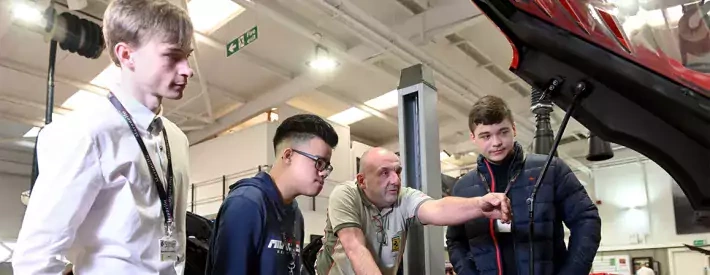Rethinking the skills mix

Businesses and new talent alike need to be EV-ready. So what might the apprenticeships of the future look like?
With the UK government now set to bring forward a ban on the sale of new petrol and diesel cars from 2040 to as early as 2030, automotive apprenticeships look likely to change dramatically as the industry goes through a period of rapid transformation.
For Dean Lander, Head of Repair Sector Services at Thatcham Research, that means we can expect to see more apprenticeships at Level 4 and above over the next decade. “These will be defined by the specialist needs that will arise as a result of the connectivity and electrification of motor vehicles,” he says. “The new skills required, such as having electrical engineers capable of working on high-voltage systems and specifically inside the battery of full-electric vehicles, will drive this forward. The battery cannot be seen as a disposable item when the replacement costs run into tens of thousands of pounds.”
Lander adds that the technological revolution in today’s automotive industry is far more significant than anything the sector has experienced over the past 50 years. In addition to high-voltage systems, communications capabilities are enabling cars to “talk” to each other, while features like emergency braking and lane assist are making motor vehicles more autonomous than ever.
“These all require new thinking and new skills,” says Lander. “Apprenticeship standards will need to evolve rapidly, or the industry runs the risk of training new entrants in out-of-date skills. If employers lose faith in apprenticeships as a result, then a skills crisis is inevitable.”
Mark Armitage, Head of Membership Products and Services at the IMI, foresees a steadier transition in apprenticeship content in the decades ahead. That’s because even though sales of new petrol and diesel vehicles will come to an end, a used vehicle park will still be in circulation for many years to come.
However, there is an immediate need for the latest technology to be included in technical apprenticeship standards. Sales of new electric cars doubled in August alone, even though the overall sales market fell by 5%. “As the fueling and engine technologies found on combustion engines will start to become less relevant, this content will need to be replaced with all of the latest information for EVs and hybrid power technologies,” says Armitage.
A change of focus
Meanwhile, other big shifts in training will relate to the scaling up of EV charging infrastructure, which will be crucial to efforts to achieve the government’s tough missions targets. “For apprentices in vehicle sales and customer service roles, there will be a need to have greater knowledge and the ability to support drivers in the transition to a different way of fueling a vehicle,” Armitage says.
“This may also spread to knowledge on home charging stations and the costs associated with these, or even being able to sell these solutions to drivers,” he adds.
Yet for all the focus on technology in apprenticeships, Frank Harvey, Head of Member Services at the Independent Garage Association, warns that the apprentices of the future will still need uniquely human skills such as communication, which is crucial to maintaining excellent customer service.
“We need people who can talk to the customer and understand their problems,” he explains.
Harvey believes that the motor industry should be looking to get into schools and recruit the technicians of tomorrow there. “We need technician apprentices, but we’re not good at pushing the career opportunities that are out there,” he says. “I started on the shop floor as an apprentice and have been fortunate to progress in my career. The opportunities in this sector are endless.”




